

Successful weight management is about being committed and following the rules you set for yourself. I’ve got a list of rules here. You can stick to all of these (wow – that’s commitment) or pick out the ones that will help you most on your weight loss journey.
 One of the most important rules of weight loss is that unless you identify the emotional triggers that cause you to overeat you are unlikely to ever adopt a truly healthy attitude to food and eating. Do you eat when you are stressed? To reach for a chocolate treat when you're lonely, upset, depressed or angry? Is your first thought of muffins or ice cream when you feel happy or excited? To identify what is real hunger and what is emotional food consumption, you'll need to rate your hunger/fullness levels before, during and after consuming food. Use a scale of 1 to 10, #1 being "beyond hungry" (with its associated lightheadedness and headaches) and #10 being "beyond full" (as in utterly stuffed after Thanksgiving meals). Ideally, you eat at level 3 hunger pangs, when you're hungry but not uncomfortable. You should ideally stop eating at level 7, when you're full and satisfied, but don't feel bloated. If you are eating for any reason other than real hunger, substitute food for a pleasurable activity such as going for a walk or spending time with a coloring book, anything that is non-food related.
One of the most important rules of weight loss is that unless you identify the emotional triggers that cause you to overeat you are unlikely to ever adopt a truly healthy attitude to food and eating. Do you eat when you are stressed? To reach for a chocolate treat when you're lonely, upset, depressed or angry? Is your first thought of muffins or ice cream when you feel happy or excited? To identify what is real hunger and what is emotional food consumption, you'll need to rate your hunger/fullness levels before, during and after consuming food. Use a scale of 1 to 10, #1 being "beyond hungry" (with its associated lightheadedness and headaches) and #10 being "beyond full" (as in utterly stuffed after Thanksgiving meals). Ideally, you eat at level 3 hunger pangs, when you're hungry but not uncomfortable. You should ideally stop eating at level 7, when you're full and satisfied, but don't feel bloated. If you are eating for any reason other than real hunger, substitute food for a pleasurable activity such as going for a walk or spending time with a coloring book, anything that is non-food related.
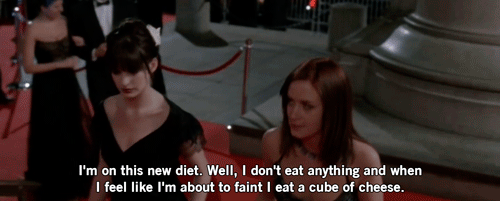 A healthy diet is rich in fruit, vegetables, whole grains and legumes. It is low in sugary foods, saturated and trans fats and refined grains. Include poultry, fish and similar lean meats, low-fat dairy foods. You should consume 20 - 35 grams of fiber a day from plant foods. Fiber fills you up and slows absorption of carbohydrates.
A healthy diet is rich in fruit, vegetables, whole grains and legumes. It is low in sugary foods, saturated and trans fats and refined grains. Include poultry, fish and similar lean meats, low-fat dairy foods. You should consume 20 - 35 grams of fiber a day from plant foods. Fiber fills you up and slows absorption of carbohydrates.
 Pig out on spinach, kale and broccoli as much as you like, but monitor higher-calorie foods with a beady eye. Portion control means checking serving sizes on food labels, where even quite small packages can contain more than one serving of your permitted calories for a single meal. The easiest way is to use "100-calorie" food packages, which help you control portion sizes, although you'll need to have the willpower not to munch several of these packages in one sitting.
Pig out on spinach, kale and broccoli as much as you like, but monitor higher-calorie foods with a beady eye. Portion control means checking serving sizes on food labels, where even quite small packages can contain more than one serving of your permitted calories for a single meal. The easiest way is to use "100-calorie" food packages, which help you control portion sizes, although you'll need to have the willpower not to munch several of these packages in one sitting.
 Another rule of weight loss is that eating more slowly and chewing better, in other words eating mindfully, gives our brains more time to pick up satiety signals. This process takes ca. 20 minutes, benefiting slow eaters, who feel fuller and eat less as a consequence. Eating slowly will make you more aware of what you are consuming; the food's smell, texture and taste will make the meal feel more satisfying.
Another rule of weight loss is that eating more slowly and chewing better, in other words eating mindfully, gives our brains more time to pick up satiety signals. This process takes ca. 20 minutes, benefiting slow eaters, who feel fuller and eat less as a consequence. Eating slowly will make you more aware of what you are consuming; the food's smell, texture and taste will make the meal feel more satisfying.
 Already touched on, mindful eating means you pay full attention to what is on your plate. Savor eat forkful, take note of what you like and what you feel doesn't taste quite so nice. Don't eat while distractions like TV, computer work or driving is going on. You will learn to eat less overall, but appreciate the food you eat far more. Once conditioned to mindful eating, your internal food editor will ignore food advertising and scoff at super-sized portions, as research has shown.
Already touched on, mindful eating means you pay full attention to what is on your plate. Savor eat forkful, take note of what you like and what you feel doesn't taste quite so nice. Don't eat while distractions like TV, computer work or driving is going on. You will learn to eat less overall, but appreciate the food you eat far more. Once conditioned to mindful eating, your internal food editor will ignore food advertising and scoff at super-sized portions, as research has shown.
 Foods low in energy density, in other words foods with fewer calories relative to their weight and volume, increase our feeling of satiety, which means you can pig out and feel full on far fewer calories. Start eating foods with a high water and high fiber content such as fruits, vegetables, broth-based soups and cooked whole grains for example. You can incorporate these food stuffs stews, pasta dishes, wraps and soups.
Foods low in energy density, in other words foods with fewer calories relative to their weight and volume, increase our feeling of satiety, which means you can pig out and feel full on far fewer calories. Start eating foods with a high water and high fiber content such as fruits, vegetables, broth-based soups and cooked whole grains for example. You can incorporate these food stuffs stews, pasta dishes, wraps and soups.
 Skipping meals is the worst you can do, for regular meal intake allows you to control portion sizes and calorie intake and supplies you with sufficient energy for whatever you need to do during the day. Skipping meals typically leads to overeating later on. If you need to snack between meals, stick to healthy mini snacks with no more than 200 calories, such as you'll find in small containers of low-fat yogurt with a few berries for example or a slice of cheese or two thin slices of turkey on half a whole-grain pita.
Skipping meals is the worst you can do, for regular meal intake allows you to control portion sizes and calorie intake and supplies you with sufficient energy for whatever you need to do during the day. Skipping meals typically leads to overeating later on. If you need to snack between meals, stick to healthy mini snacks with no more than 200 calories, such as you'll find in small containers of low-fat yogurt with a few berries for example or a slice of cheese or two thin slices of turkey on half a whole-grain pita.
 You are free to experiment as much as possible with "good" foods like fruit and vegetables that are low in calories and high in vitamins and fiber, but you should be mindful that abundance of choices can lead to over-consumption again. You are likely to eat less, if there's less choice on offer. Being too restrictive though will make meals dull and can lead to snacking. Find an acceptable median or use smaller plates, which will limit what you can pile on in one serving.
You are free to experiment as much as possible with "good" foods like fruit and vegetables that are low in calories and high in vitamins and fiber, but you should be mindful that abundance of choices can lead to over-consumption again. You are likely to eat less, if there's less choice on offer. Being too restrictive though will make meals dull and can lead to snacking. Find an acceptable median or use smaller plates, which will limit what you can pile on in one serving.
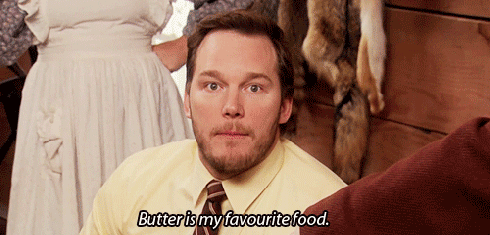 To achieve an adequate intake of protein, you should include some in every meal. Research shows that protein increases satiety more than carbohydrates and ensures that you don't lose muscle when you want to lose weight. Lean protein sources like beans and other legumes, non- or low-fat dairy and white-meat poultry will help you do just that, as will those rich in healthy fats: fish, soy foods and nuts. There's also research that suggests we should spread our protein intake throughout the day when we want to lose weight.
To achieve an adequate intake of protein, you should include some in every meal. Research shows that protein increases satiety more than carbohydrates and ensures that you don't lose muscle when you want to lose weight. Lean protein sources like beans and other legumes, non- or low-fat dairy and white-meat poultry will help you do just that, as will those rich in healthy fats: fish, soy foods and nuts. There's also research that suggests we should spread our protein intake throughout the day when we want to lose weight.
 Slimmers usually forget that liquid calories also count towards their daily allowance, even if drinks aren't nearly as satiating as solid foods. Drink milk by all means, but otherwise stick to water or herbal teas or black coffee. It's better to have a whole fruit than fruit juice. You can make water taste differently by simply squeezing a little lemon or lime juice into it.
Slimmers usually forget that liquid calories also count towards their daily allowance, even if drinks aren't nearly as satiating as solid foods. Drink milk by all means, but otherwise stick to water or herbal teas or black coffee. It's better to have a whole fruit than fruit juice. You can make water taste differently by simply squeezing a little lemon or lime juice into it.
Eating home cooked food will allow you the greatest control over your food intake. Have more whole foods and less high-calorie foods. Choose healthy, low-calorie recipes that provide you with a nutrition breakdown and overall calorie count and be sure to stick to serving sizes.
 Choose low-calorie options from menus at the restaurant (or look up calorie counts for meals online before you visit the place). Stay clear of super-sized meals and high-calorie foods. If there's too much on the plate, ask for half to be taken off and wrapped up for you to take home before you've tasted any of it. As the waiter about the lower-calorie option meals and ask for salad dressings on the side, which will allow you to control usage. Remember: restaurants offer less-healthy meals for the cheapest price, so don't fall for their sales tactics.
Choose low-calorie options from menus at the restaurant (or look up calorie counts for meals online before you visit the place). Stay clear of super-sized meals and high-calorie foods. If there's too much on the plate, ask for half to be taken off and wrapped up for you to take home before you've tasted any of it. As the waiter about the lower-calorie option meals and ask for salad dressings on the side, which will allow you to control usage. Remember: restaurants offer less-healthy meals for the cheapest price, so don't fall for their sales tactics.
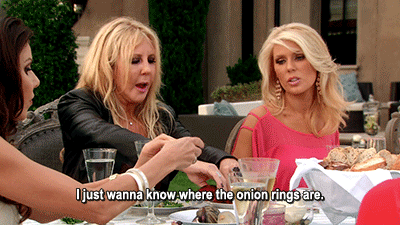 Your body's inner reward system registers fatty and sugary foods as far more pleasurable than a plate full of spinach, so allow yourself the occasional treat from foods you crave, but be sure to control size of intake very strictly. Over-restriction may lead to binging, so it's not a good idea to do without your favorites completely. A small daily treat or saved up treats for weekends, when you've had a chance to do lots of exercise, is fine. If you're one of those people with no will of their own to resist the temptation of desserts or chocolate bars, it's probably best to find a different, non-food related treat.
Your body's inner reward system registers fatty and sugary foods as far more pleasurable than a plate full of spinach, so allow yourself the occasional treat from foods you crave, but be sure to control size of intake very strictly. Over-restriction may lead to binging, so it's not a good idea to do without your favorites completely. A small daily treat or saved up treats for weekends, when you've had a chance to do lots of exercise, is fine. If you're one of those people with no will of their own to resist the temptation of desserts or chocolate bars, it's probably best to find a different, non-food related treat.
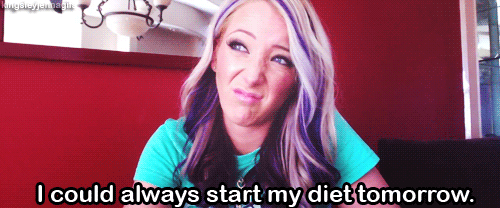 Controlling your "food environment" will be far easier than relying on will power. Don't keep junk food in the home, change your routine so you won't be exposed to food temptations (don't go into the office pantry between meals if it's likely you'll be tempted by unprotected chocolate bars people leave lying around). Line up smaller plates, soup and cereal bowls, cups and utensils to keep portion sizes small.
Controlling your "food environment" will be far easier than relying on will power. Don't keep junk food in the home, change your routine so you won't be exposed to food temptations (don't go into the office pantry between meals if it's likely you'll be tempted by unprotected chocolate bars people leave lying around). Line up smaller plates, soup and cereal bowls, cups and utensils to keep portion sizes small.
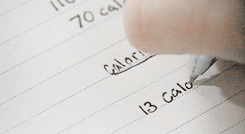 Studies have shown that dieters who record their food intake regularly will shed weight more quickly than slimmers who keep no food diary. Record what you eat in a notebook or your laptop or Smartphone. Be consistent and honest - never cheat, include dressings, condiments and tastings you make while home-cooking meals. Recording food intake will make you more accountable and shows up eating habits quite quickly that may be related to your emotional state (see point 1).
Studies have shown that dieters who record their food intake regularly will shed weight more quickly than slimmers who keep no food diary. Record what you eat in a notebook or your laptop or Smartphone. Be consistent and honest - never cheat, include dressings, condiments and tastings you make while home-cooking meals. Recording food intake will make you more accountable and shows up eating habits quite quickly that may be related to your emotional state (see point 1).
 Shedding weight takes time, therefore it is important that you set realistic goals for weight loss, otherwise you'll only get frustrated and give up. In addition, you'll need to adopt a realistic view of what body image you'll end up with, when you've shed weight. Even losing 10 pounds a week won't turn you into Angelina Jolie, if nature didn't bless you with the requisite looks and long limbs. Small and steady weight losses of one to two pounds a week will ensure you'll keep off the weight long-term. Just losing an excess weight of 5 to 10 pounds will improve your health and feeling of wellbeing, so bear that in mind.
Shedding weight takes time, therefore it is important that you set realistic goals for weight loss, otherwise you'll only get frustrated and give up. In addition, you'll need to adopt a realistic view of what body image you'll end up with, when you've shed weight. Even losing 10 pounds a week won't turn you into Angelina Jolie, if nature didn't bless you with the requisite looks and long limbs. Small and steady weight losses of one to two pounds a week will ensure you'll keep off the weight long-term. Just losing an excess weight of 5 to 10 pounds will improve your health and feeling of wellbeing, so bear that in mind.
 Rules of weight loss also include a close look at how much sleep a slimmer gets per night. Although it varies from person to person what the optimal number of hours is per night, getting less than six hours a night is considered not enough and has been shown to lead to weight gain. Insufficient sleep may impact on appetite hormones and increase our hunger pangs and food intake. It also slows down calorie-burning and raises fat storage.
Rules of weight loss also include a close look at how much sleep a slimmer gets per night. Although it varies from person to person what the optimal number of hours is per night, getting less than six hours a night is considered not enough and has been shown to lead to weight gain. Insufficient sleep may impact on appetite hormones and increase our hunger pangs and food intake. It also slows down calorie-burning and raises fat storage.
Which of the rules are the most important to you?
Please rate this article
More